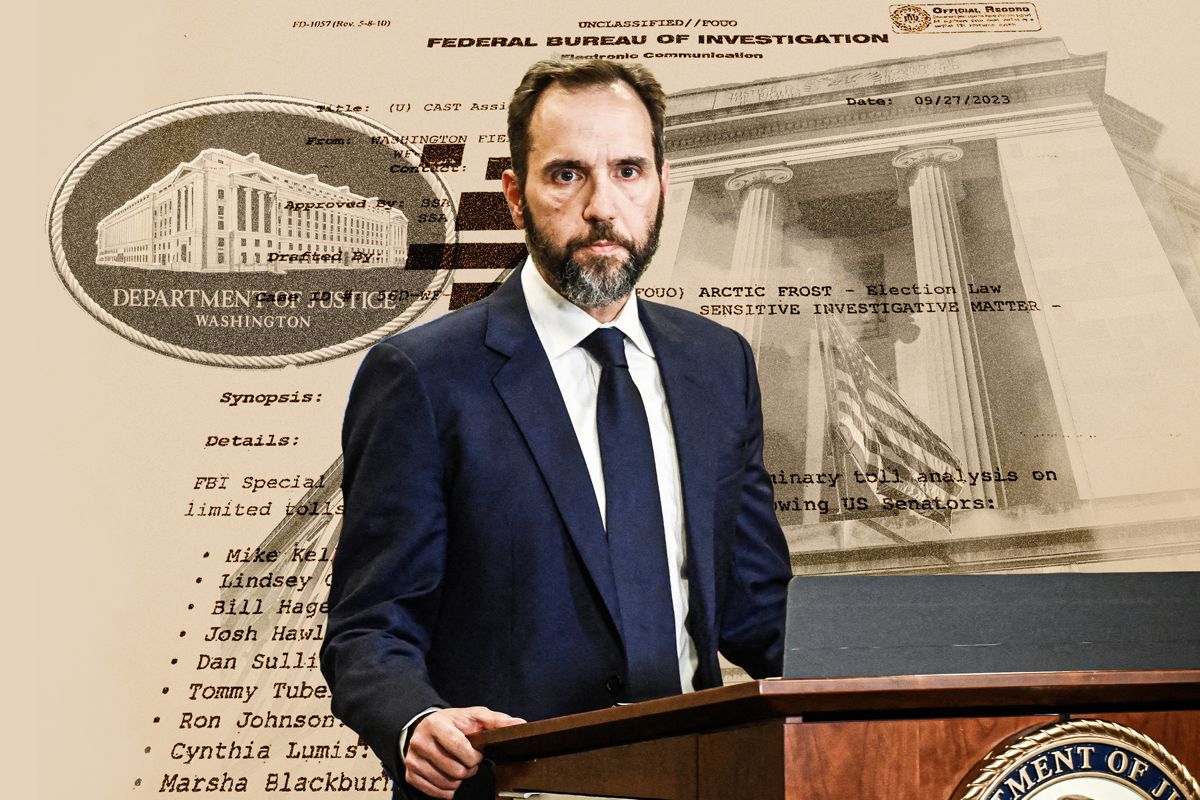Legal experts say the sprawling investigation of a 2020 alternative electors criminal ‘conspiracy’ was an unconstitutional fishing expedition.
On the grounds of an election conspiracy investigation, the Department of Justice and the FBI under President Joe Biden pursued sensitive and private information on political opponents, including President Donald Trump, his close advisers and lawyers, as well as Republican Congress members and a number of conservative organizations.
Codenamed Arctic Frost, the investigation morphed into a special counsel investigation against Trump in 2023, which was dropped after Trump’s reelection.
Documents recently released by whistleblowers reveal how nearly 200 secret subpoenas sought documents and communications—including call records of eight senators—from hundreds of Republican individuals and organizations.
The probe was opened on the premise that it was criminal of the Trump campaign to arrange alternative sets of electors in states where the campaign was challenging the 2020 election results.
“Subjects corruptly conspired to obstruct the United States Congress’ certification of the 2020 Presidential election results by submitting fraudulent certificates of electors’ votes to the United States Government,” the opening document stated.
There were multiple problems with the legal theory, according to experts, who also said the scope and nature of the investigation were highly irregular and potentially unconstitutional.
Information about the probe has been released over recent months by Trump’s DOJ and Congress Republicans, particularly Sens. Chuck Grassley (R-Iowa) and Ron Johnson (R-Wis.), as well as the House Judiciary Committee.
| Expanding in Scope |
| Targeting Members of Congress |
| ‘Fishing Expedition’ |
| Alternative Electors |
| Path Forward |
Expanding in Scope
Arctic Frost was opened on April 13, 2022, by Timothy Thibault, then-FBI Assistant Special Agent in Charge at the Washington Field Office. The following month, Grassley sent a letter to the DOJ and FBI questioning Thibault’s anti-Trump and anti-conservative social media activity. Thibault retired four months later.
The probe appeared to be founded on the premise that whoever raised concerns about the 2020 election results and was in any way connected to the Trump Campaign took part in a conspiracy, noted Hans von Spakovsky, an election law expert and senior legal fellow at the conservative Heritage Foundation.
Consequently, the investigation repeatedly expanded in scope.
At opening, the probe targeted the Trump Campaign, several individuals associated with it, and the roughly 60 alternate electors in Arizona, Georgia, Michigan, Nevada, and Wisconsin.
Already on May 4, 2022, the FBI obtained the government-issued phones of Trump and Vice President Mike Pence, according to internal emails provided by whistleblowers to Grassley and Johnson. At that time, neither was officially a target of the investigation.
Shortly after, Trump and others were added as targets.
On Nov. 18, 2022, the case was taken over by then-Special Counsel for the DOJ Jack Smith for the special counsel investigation, and expanded further still.
Over 400 Republican organizations and individuals were targeted with nearly 200 secret subpoenas seeking documents, financial records, and communications, often going several years back, according to documents provided through whistleblower disclosures to Grassley and which he released on Oct. 29.
The individuals included Trump’s former chief of Staff Mark Meadows, his deputy Dan Scavino, as well as Trump’s lawyers and legal advisers, such as constitutional scholar John Eastmann, former New York City Mayor Rudy Giuliani, and former DOJ official Jeff Clark.
The organizations included conservative youth group Turning Point USA, think tanks America First Policy Institute and America First Legal, as well as the Republican Attorneys General Association.
The pursuit of copious subpoenas on such an open-ended theory of a conspiracy should have been shut down by the DOJ and FBI leadership, according to Horace Cooper, a senior fellow with the National Center for Public Policy Research, who formerly taught constitutional law at George Mason University.
“They should use their prudential judgment to say, ‘Oh no, this is a step too far. There’s not enough here,’” he told The Epoch Times.
His assessment was seconded by von Spakovsky.
“There was no lawful reason for the vast majority of those organizations to be investigated,” he told The Epoch Times.
Targeting Members of Congress
One document that particularly irked Congress Republicans showed that Smith obtained call records of eight GOP senators, including Johnson, Marsha Blackburn (R-Tenn.), Lindsey Graham (R-S.C.), Bill Hagerty (R-Tenn.), Josh Hawley (R-Mo.), Cynthia Lummis (R-Wyo.), Dan Sullivan (R-Alaska), and Tommy Tuberville (R-Ala.). One House member was also on the list, Rep. Mike Kelly (R-Pa.).
The call logs covered the period of Jan. 4, 2021, to Jan. 7, 2021, the senators were told by FBI Deputy Director Dan Bongino (pdf).
In addition, Smith seized the phone of Rep. Scott Perry (R-Pa.) and subpoenaed phone records of Sen. Ted Cruz (R-Tex.). AT&T resisted the subpoena and Smith dropped it, but Verizon complied, Grassley revealed at an Oct. 29 press conference.
Cooper said that Congress members’ communications carried out in the course of legislative duties are shielded by the Constitution’s Speech and Debate Clause.
“If a senator has a conversation with the former president, the burden is on the accuser to explain why that conversation was not a part of that senator’s responsibilities under the United States Constitution,” he said. “You can’t say, ‘Well, he’s very likely conspiring or willing to conspire.’”
The subpoenas also raise separation of power issues, von Spakovsky said.
“Investigating members of the U.S. Congress is a direct interference with the legislative branch by the executive branch. I think it raises very serious constitutional issues and problems, particularly because there was no evidence whatsoever that any of those eight senators and the U.S. member of the House had violated any criminal law,” he said.
Compounding the issue, he noted, was an order by the District of Columbia federal District Court Chief Judge James Boasberg that kept the subpoena secret from the lawmakers.
“That’s an outright violation of federal law. There’s a federal statute that specifically says that Senate offices have to be notified,” von Spakovsky said, referring to the notification rules established by the 2 USC 6628.
Cruz called the order “an abuse of power.”
“This order is a weaponized legal system,” the senator said during the press conference.
By Petr Svab








